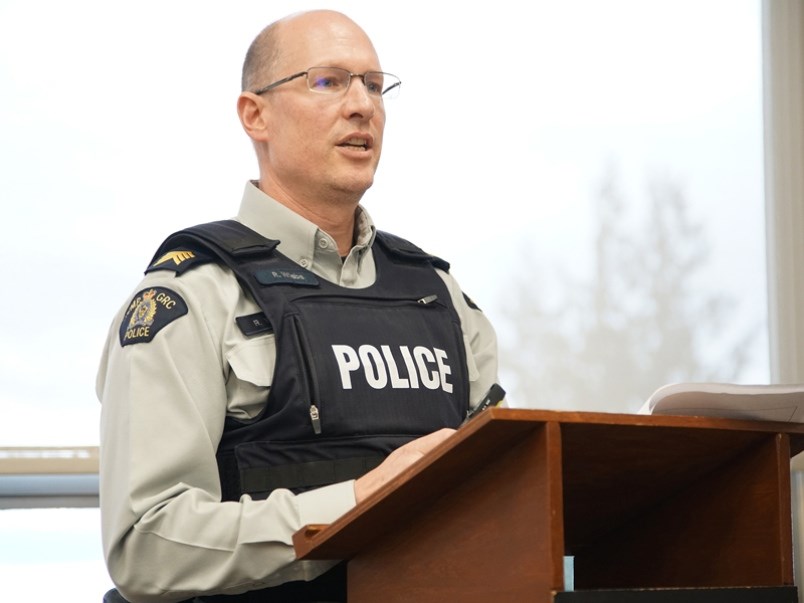Crime statistics in the regional areas are showing an increase.
At the Thursday, March 12, qathet Regional District committee of the whole, Powell River RCMP Staff Sergeant Rod Wiebe gave a report on crime statistics and outlined what was happening in the regional district.
The area outside of the City of Powell River had an increase in calls for service. In 2018 the figure was 1,348 and in 2019 the figure was 1,438, for a seven per cent increase. Texada Island is up 10 per cent, from 271 in 2018 to 299 calls in 2019, Lund is up 13 per cent, from 69 to 78 calls, and the southern areas are up 21 per cent, from 546 calls in 2018 to 661 in 2019.
Savary Island recorded a drop in calls, down six per cent from 78 in 2018 to 69 in 2019.
Wiebe outlined the local detachment’s priorities for 2019-2020, focusing on the detachment’s proactive time, calculated to be at about 16 per cent, which is less than 10 minutes every hour.
“Most of our time is spent on calls for service and conducting investigations,” said Wiebe.
He outlined the priorities, which included: road safety, crime reduction, youth, domestic violence, employee wellness and working with Tla’amin Nation.
Crime reduction included the tactical enforcement program, taking down drug traffickers.
Wiebe said the detachment didn’t do as well as hoped with youth initiatives this year.
In terms of domestic violence, the detachment worked with inter-agency training and supporting other agencies. He said there was an eight per cent decrease in domestic violence last year over the previous year.
“We’re happy with that number,” said Wiebe.
In terms of employee wellness, he said, we’ve all heard how hard it is going to all of these calls and it is a focus to keep employees well so they can stay at work.
With Tla’amin Nation, the RCMP does a lot with their cultural workshops.
“Our liaison officer does an amazing job out there,” said Wiebe. “I think they are happy with what we provide to them as well.”
Electoral Area A director Patrick Brabazon brought up the local domestic violence issue. He asked if there was more that could be done on the domestic violence front because the issue is truly local.
Wiebe said it was probably one of the most difficult offences to engage. Victims are usually female and they rely on the family unit for mental support and finances. Sometimes there are kids involved. He said the last statistic that he saw, which is fairly old, is by the time domestic violence is reported to the police, it has already happened at least 10 times.
“It’s really hard and not always a cooperative dynamic,” Wiebe said. “We focus on education, partnering with the ministry of social services.”
Committee chair Sandy McCormick said on Texada Island, two constables arrived within a day or two with no overlap. She said that has been resolved, but she would encourage, wherever possible, for the RCMP to ensure there is an overlap of one constable arriving at one time instead of both being brand new.
Wiebe said they were due to be staggered but circumstances dictated otherwise.
Electoral Area B director Mark Gisborne said he had a question about drug trafficking. He said he was seeing cannabis included in the list of seizures.
“Since cannabis is now legal, why is this being pursued? Are these unauthorized growers that you’re going after? Why is it still a priority after the changes from the federal government?” asked Gisborne.
Wiebe said seizures were far in excess of the legal limit of cannabis stipulated by the federal government. He said it was still illegal in a criminal sense to grow cannabis outside of the regulations.
“These are very large, organized inventories,” said Wiebe.



